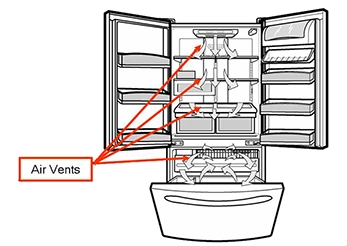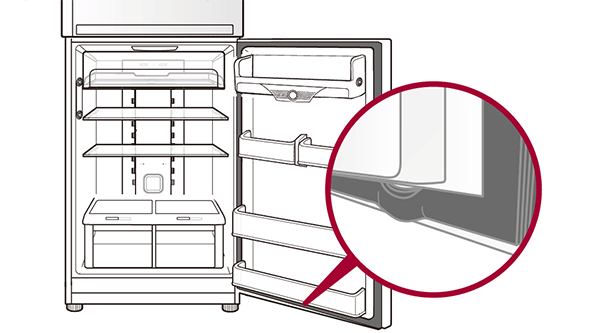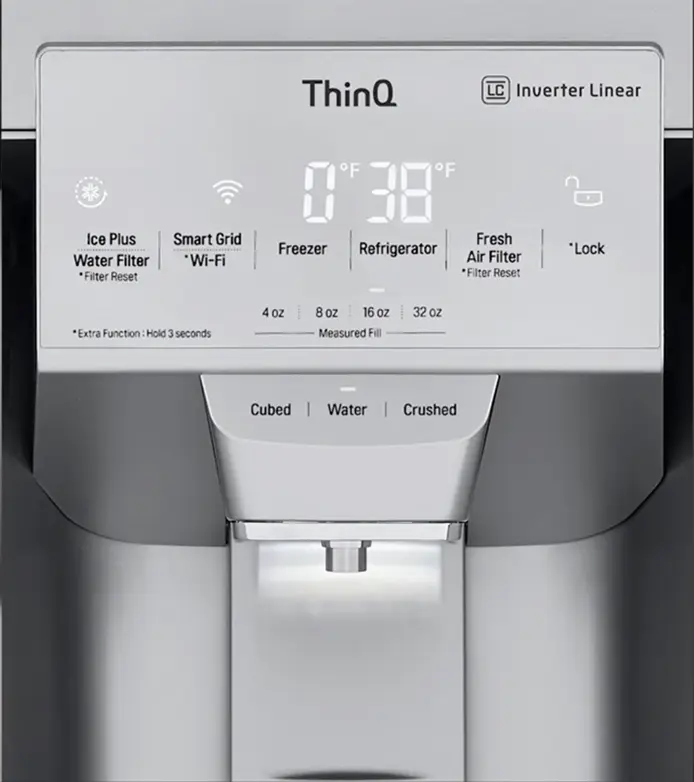Has your fridge also stopped cooling like my fridge, if you are also going through the same problem then let us together solve this cooling problem. If your LG fridge does not cool during the summer, your leftover food may get spoiled.
There can be many reasons for the refrigerator not cooling, some of which we can fix quickly. Our hands-on experience guide aims to tell you why the refrigerator is not cooling and how you can fix these issues yourself.
Let us know how we troubleshoot these common issues.
Possible Causes of LG Refrigerator Not Cooling
Dirty Condenser Coils: collected specks of dirt on the condenser coils can hinder heat transfer, leading to cooling issues.
Check Thermostat Functionality: When a thermostat in a refrigerator is not working properly, it can mess up how cold the fridge gets, making it not cool things as it should.
Inspect Evaporator Fan Motor: A broken evaporator fan can cause problems with your cooling system. fan is responsible for circulating cool air throughout the system. If it is not working properly, your system may not be able to cool your space effectively.
Verify Compressor Functionality: Issues with the compressor, like a defective start relay or capacitor, can prevent proper cooling as it regulates the refrigerant flow.
Low Refrigerant Levels: Insufficient refrigerant can impact the cooling process, causing the refrigerator not to cool effectively.
Blocked Air Vents: Obstacles in the air vents can restrict airflow, leading to uneven cooling or lack of cooling in certain areas of the refrigerator.

Examine Temperature Control Board: A malfunctioning temperature control board can disrupt the cooling cycle and impact the refrigerator’s ability to maintain the desired temperature.
Inspect Door Seals: Worn-out or damaged door seals can allow warm air to enter the refrigerator, affecting its cooling efficiency.

Confirm Proper Temperature Settings: Incorrect temperature settings can lead to the refrigerator not cooling Enough.
How to Fix LG Refrigerator not Cooling
Your LG refrigerator won’t cool properly, huh? That’s a bummer, especially when you are looking forward to a cold drink.
First things first, check if your freezer is still working because sometimes the freezer compartment is chilled, but the fridge not cooling is the real headache. Now, let’s try a quick fix.
Unplug that bad boy – I mean, the power cord from the power supply – wait about 30 seconds to reset the refrigerator, and then plug it back in. This can blow some life back into your appliance.
If that doesn’t work, make sure the freezer door and refrigerator door are closing tight.
Sometimes, a sneaky drawer that’s not fully closed can mess with the cold air circulation.
Not cool, right? Also, peep the recommended temperature for the refrigerator on the LG site or the LG USA support transcript to ensure it’s set to get your eats cold enough.
If you have danced – defrosting, checking the compressor, ensuring it’s not an overloaded ice maker, and your appliance repair skills have hit a wall, it might be time to hit up a professional repair service.
Before you scream ‘Why me?’, contact us at LG support or find some troubleshooting steps on the LG site.
Who knows? It might be something simple like flipping the circuit breaker or getting that refrigerator installed properly if it’s still throwing tantrums about wanting to get cold.
Also, a pro tip: sometimes the compartment behind the French door refrigerators gets a bit temperamental.
Make sure nothing’s blocking the vents; air needs to circulate to keep things cool. And hey, sometimes the universe just decides it’s time for your fridge to act up, but don’t let it ruin your day.
With a bit of DIY or a nudge to LG’s repair service, your fridge should be back to working normally, ready to tackle whatever leftovers you throw its way.
My Personal Experience
Recently, I observed water near my refrigerator’s freezer, which had leaked from the water dispenser. Upon examination, I discovered that all the items in my freezer had defrosted. To troubleshoot, I performed the following steps:
- I cleaned the condenser coil, which was dirty.
- The condenser fan was operating correctly.
- The compressor appeared to be functioning correctly, with no unusual sounds.
- The evaporator coil was not frozen, and I could confirm this by opening the panel.
- The evaporator fan was continuously running, even with the door open.
I’m unsure what else to check, as the compressor seems to be functioning correctly in the refrigerator but not in the freezer. Any further suggestions would be greatly appreciated.
Request a Repair
If you’ve tried all the steps before and your unit still isn’t cooling down, then it’s time to request a repair. You can easily do this by chatting with our support team who are available 24/7.
If your unit’s warranty has already expired, please reach out to your extended warranty service provider or give us a call at 800-243-0000.
Key Points
Adjust the temperature settings: The ideal temperature for the refrigerator is 37°F and 0°F for the freezer.


Check the current temperature: If the temperature is above the recommended settings, you should lower it. If it’s below the recommended settings, you don’t need to adjust it.
Make sure demo mode is off: If you see “OF DEMO MODE” on the control panel, it means that demo mode is still on, and you should turn it off.
Avoid putting hot food directly in the refrigerator: Hot food can temporarily raise the temperature inside the refrigerator, so it’s best to let it cool down before putting it in.
Ensure that air vents are not blocked: Make sure that there is enough space around the vents for air to circulate.
Avoid opening the door too frequently: Try to limit how often you open the door to keep the cold air inside.
Check the spacing around the unit: Make sure that there is enough space around the unit for proper airflow.
Summing…
When an LG refrigerator stops cooling, it can be due to various reasons like dirty condenser coils, thermostat issues, a faulty evaporator fan motor, compressor problems, low refrigerant levels, blocked air vents, temperature control board malfunctions, and damaged door seals.
To troubleshoot, unplug the fridge, check door seals, ensure proper temperature settings, and consider professional repair if needed.
FAQs
What are some common reasons my LG refrigerator is not cooling properly?
Common reasons include issues with the compressor, a faulty evaporator fan motor, dirty condenser coils, problems with the thermostat, or a malfunctioning temperature sensor. Dust and debris affecting the condenser can also lead to cooling issues.
How can I troubleshoot the temperature control in my fridge?
Start by checking the set temperature inside the fridge to ensure it’s correct. If your refrigerator compartment is too warm, try adjusting the thermostat to a cooler setting. Also, make sure that the doors are closed tightly and the door seals, or gaskets, are not damaged to prevent warm air from entering.
Can a dirty condenser coil affect my refrigerator’s cooling performance?
Absolutely! When the condenser coils are clogged with dust and debris, they can’t release heat as efficiently, leading to poor cooling performance. Cleaning them with a vacuum cleaner can help improve refrigeration.
What should I do if the evaporator fan in my LG fridge stops working?
The evaporator fan circulates air over the coils, helping to keep the refrigerator cool. If it’s not working, check for any obstructions or signs of damage. You might need to replace the evaporator fan motor to resolve the cooling issue.
Why is it important to defrost my LG refrigerator if it has a defrost problem?
A defrost problem can lead to ice buildup, which insulates the coils from the air inside the fridge, affecting the cooling. Regularly defrosting your fridge helps maintain optimal cooling performance and prevents longer-term issues.
How can I contact you if my fridge’s compressor may need replacing?
If you suspect that the compressor may be the cause of your cooling issues, it’s best to contact us directly for support. The compressor is a critical part of the refrigerator’s sealed system, and replacing it might require professional help.
Are there any 5 quick tips to potentially fix minor cooling issues with my LG fridge?
Yes! 1) Clean the condenser coils to ensure they’re free of dust and debris. 2) Check and adjust the thermostat as needed. 3) Rearrange the food in the refrigerator to ensure proper air circulation. 4) Make sure the doors are sealing properly. 5) Try unplugging the unit or turning off the circuit breaker for 30 seconds to reset the control board.
Can issues with my LG refrigerator lead to a class action lawsuit?
While specific issues with LG refrigerators have led to class action lawsuits in the past, whether or not your refrigerator’s problem qualifies depends on the nature and severity of the issue. It’s recommended to seek legal advice if you believe your refrigerator’s issue could be part of a larger problem.